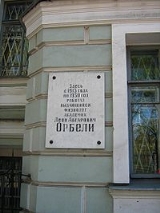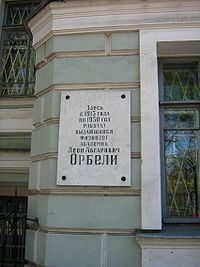
Leon Orbeli
Encyclopedia

Armenia
Armenia , officially the Republic of Armenia , is a landlocked mountainous country in the Caucasus region of Eurasia...
n physiologist active in the Russian SFSR. He was a member of the Academies of Science of USSR and Armenian SSR
Armenian SSR
The Armenian Soviet Socialist Republic The Armenian Soviet Socialist Republic The Armenian Soviet Socialist Republic The Armenian Soviet Socialist Republic The Armenian Soviet Socialist Republic The Armenian Soviet Socialist Republic The Armenian Soviet Socialist Republic The Armenian Soviet...
(the latter was founded by his brother Joseph Orbeli
Joseph Orbeli
Joseph Orbeli , 1887 – February 2, 1961) was a renowned Soviet orientalist and academician of Armenian descent who specialized in medieval history of Southern Caucasus and administered the State Hermitage Museum in Leningrad from 1934 to 1951...
). Levon Orbeli became director of the Institute of Physiology in 1950.
Orbeli played an important part in the development of evolutionary physiology
Evolutionary physiology
Evolutionary physiology is the study of physiological evolution, which is to say, the manner in which the functional characteristics of individuals in a population of organisms have responded to selection across multiple generations during the history of the population.It is a subdiscipline of both...
and wrote more than 200 works on experimental and theoretical science, 130 of them journal articles. Alexandr Gyietsinski, with whom he shares eponymic fame, was one of his students.
Career
Levon (or Leon) Orbeli was born in Tsaghkadzor, Armenia (then Darachichag, Erivan GovernorateErivan Governorate
Erivan Governorate was one of the guberniyas of the Russian Empire, with its centre in Erivan . Its area was 27,830 sq. kilometres. It roughly corresponded to what is now most of central Armenia, the Iğdır Province of Turkey, and Azerbaijan's Nakhchivan exclave...
, Russian Empire
Russian Empire
The Russian Empire was a state that existed from 1721 until the Russian Revolution of 1917. It was the successor to the Tsardom of Russia and the predecessor of the Soviet Union...
) . He graduated from the Gymnasium
Gymnasium (school)
A gymnasium is a type of school providing secondary education in some parts of Europe, comparable to English grammar schools or sixth form colleges and U.S. college preparatory high schools. The word γυμνάσιον was used in Ancient Greece, meaning a locality for both physical and intellectual...
in Tbilisi
Tbilisi
Tbilisi is the capital and the largest city of Georgia, lying on the banks of the Mt'k'vari River. The name is derived from an early Georgian form T'pilisi and it was officially known as Tiflis until 1936...
in 1899 and entered the Military Medical Academy in St. Petersburg. While still a student in the second course he began to work in the laboratory of Ivan Petrovich Pavlov (1849–1936). For the next thirty-five years, Orbeli's life and scientific career were closely connected with the work of Pavlov.
Orbeli graduated from the Military Medical Academy in 1904 and became an intern
Intern
Internship is a system of onthejob training for white-collar jobs, similar to an apprenticeship. Interns are usually college or university students, but they can also be high school students or post graduate adults seeking skills for a new career. They may also be as young as middle school or in...
at the Nikolai Hospital in Kronshtadt, the Naval Hospital in St. Petersburg. This gave him the opportunity to continue his experimental research in Pavlov's laboratory.
Orbeli's scientific career was spent in the leading Russia
Russia
Russia or , officially known as both Russia and the Russian Federation , is a country in northern Eurasia. It is a federal semi-presidential republic, comprising 83 federal subjects...
n physiological centres, and he joined Pavlov in 1907, at the very height of Pavlov's research on conditioned reflexes. He was Pavlov's assistant in the Department of Physiology at the Institute for Experimental Medicine from 1907 to 1920.
From 1918-1946 he was head of the Department for Physiology of the State Institute for Science Research P. F. Lesgaft
Peter Lesgaft
Peter Franzevich Lesgaft was a Russian teacher, anatomist, physician and social reformer. He was the founder of the modern system of physical education and medical-pedagogical control in physical training, one of founders of theoretical anatomy. P.F. Lesgaft Institute of Physical Culture in St...
, located at the Petrograd Scientific Institute in the Biological Station in Koltushi. Orbeli was professor of physiology at the First Leningrad Medical Institute from 1920 to 1931, and from 1925 to 1950 professor of physiology at the Military-Medical Academy. He was head of the latter from 1943 to 1950.
Orbeli worked for two years abroad, with Karl Ewald Konstantin Hering (1834–1918) in Germany
Germany
Germany , officially the Federal Republic of Germany , is a federal parliamentary republic in Europe. The country consists of 16 states while the capital and largest city is Berlin. Germany covers an area of 357,021 km2 and has a largely temperate seasonal climate...
, John Newport Langley
John Newport Langley
John Newport Langley was a British physiologist. He spent his entire career at Cambridge University. He was elected a Fellow of the Royal Society in 1883 and later its vice-president....
(1852–1925) and Joseph Barcroft
Joseph Barcroft
Sir Joseph Barcroft CBE, FRS was a British physiologist best known for his studies of the oxygenation of blood....
(1872–1947) in England
England
England is a country that is part of the United Kingdom. It shares land borders with Scotland to the north and Wales to the west; the Irish Sea is to the north west, the Celtic Sea to the south west, with the North Sea to the east and the English Channel to the south separating it from continental...
, and at the Marine Biological Station in Naples
Naples
Naples is a city in Southern Italy, situated on the country's west coast by the Gulf of Naples. Lying between two notable volcanic regions, Mount Vesuvius and the Phlegraean Fields, it is the capital of the region of Campania and of the province of Naples...
. After Pavlov's death in 1936, Orbeli, now Russia's most prominent scientist, was appointed director of the Pavlov Institute. From 1939 to 1946 he was secretary to the Department of Biological Science and vice president of the Academy of Sciences of the USSR
Russian Academy of Sciences
The Russian Academy of Sciences consists of the national academy of Russia and a network of scientific research institutes from across the Russian Federation as well as auxiliary scientific and social units like libraries, publishers and hospitals....
.
In 1956 Orbeli organized the I. M. Sechenov Institute of Evolutionary Physiology and headed this institution until 1958. It was later renamed I. M. Sechenov Intstitute of Evolutionary Physiology and Biochemistry of the Academy of Sciences of the U.S.S.R. In 1935 he was elected an active member of the Academy of Sciences of the U.S.S.R. In 1945 he was awarded the title of Hero of Socialist Labor
Hero of Socialist Labor
Hero of Socialist Labour was an honorary title in the Soviet Union and other Warsaw Pact countries. It was the highest degree of distinction for exceptional achievements in national economy and culture...
. He held the rank of Colonel General.

